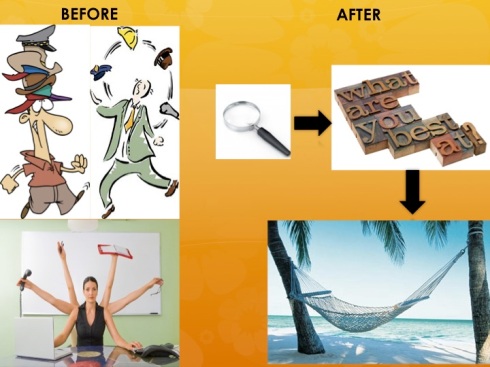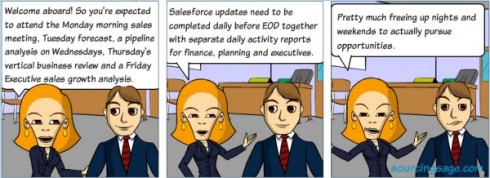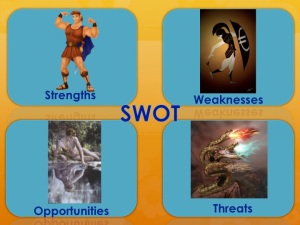Last week I got a call from the founder of an ex vendor partner. She is CEO of a customer software and apps development company that is roughly 10 years old. She basically called me for a ref check on a key hire. They are now 65 people, want to expand geographically – not just from a sales perspective, but also wants to open an entity in the U.S., is thinking of maybe creating an employee stock option plan; and ofcourse is beginning to think of exit options – not necessarily now, but atleast consider a possibility in the very distant future. On the HR side, she is saying while she does have a solid core of early employees, she is thinking of hiring senior talent, and of offering her employees benefits that will make her competitive in the market.
So far, her way of dealing with all of this was to do it herself. She said – she’s read more books on finance and accounting now than she ever did before, and she has even attended conferences about company structure etc.
Now ofcourse she has finally realized it’s high time she stopped stretching her own self thin enough to do everything, but more importantly, its stopping her from focusing on what she really should be doing – business development!
Her question to me, as we were discussing this issue, was – what is the right time to start hiring “support functions”. Is it a waste of precious money to get someone early on when you can so easily do it yourself – specially, as in the case with a lot of start ups, you are self funded! Familiar, right?
My advice/ experience as follows:
a) In the beginning in many cases you will deal with these issues yourself. But, it would be prudent to get some degree of expertise in these functions you don’t really consider important – the expertise could be friends and family if you are lucky. But if you are not, talk to as many people in your network to get different points of view. Most importantly, contract some degree of expertise to an expert service provider – you don’t have to hire; but you can outsource – if you don’t need full time help, you could use a project based, or a consultancy model. But think of what can happen if you don’t:
i. Enterprise structure: In our case, we were 4 partners, with very different citizenship statuses (should it be statii?) – In the beginning, we just created a Delaware LLC on our own, and had one of the partners appointed as the defacto “CFO”. Thank god we figured out soon that we didn’t want to do this – and contracted out to a small but respectable accounting firm both in India and the U.S. Otherwise, at exit, we may not have been able to exploit the full valuation due to a problem in what was “seed money” – we faced a hotly debated issue on whether sweat equity was considered enough investment! Uff!!!
ii. Funding/ ownership status: More in the U.S., there are restrictions on what type of funding allows what kinds of benefit – hopelessly complicated to folks not in the know, and you want to make sure while you take angel/ seed money you are getting the right bang for the buck
iii. Tax Breaks: A decision we didn’t take in the beginning – because we thought – why hurry/ we are too small/ its not worth it – came back to haunt us very often. This was the registering of our entity under the then prevalent STPI – if we had done it at the beginning, we would have saved us a lot of cash in tax breaks – as it happened, when we did finally get advice, we kept resisting it – and when we finally made the conversion, we could only do it for a small part of the entity – and it was too little too late (the STPI law expired soon thereafter anyway)
iv. Perfect Book Keeping: Thanks to having hired our CA firm on a retainer and over a cple of years having bargained for a dedicated resource on our account, we had our financial books in perfect order. When we did finally start/ hire our finance department, this resource was one of the first people we took onboard – he remains with us still – and so our history was intact in people as well as ofcourse documentation
v. Finally, during exit : As our acquiring company was undertaking accounting due diligence, our financial MIS/ processes and books were in perfect order – so much so, that a company 150 times ours in size, and an expert at financial services processes to boot had to confess that we beat them at the process game!
The most important part in all of this was – we never – really never, struggled with the boring details of audits and books – we just left it to the experts. Ofcourse, it’s important to therefore get the RIGHT experts – in our cases, our partner was a firm of really experienced accountants, who kind of “took us under their wings” and pretty much mentored us on all aspects. More importantly, realizing the stage of startup – their retainer fees for us was smallish. – it grew as we grew, so it wasn’t entirely charity!
Some 3 years down the line, when we were like a hundred people, we figured – like the CEO who had the problem to begin with – that we did need to take our finances inhouse. Here there was not only accounting issues, but we really wanted to start using our money effectively. So, we started our finance department – our CFO essentially helped us invest wisely, got the accounts streamlined; put in place super practices for sales invoicing in the U.S. as well; helped us quasi – start a financial services business; helped set up our employee phantom stock option plan; in short – became a friend, philosopher guide. In addition, he was the first person outside of the partners that knew of the potential acquisition – and he pretty much single handedly navigated those waters. He made many fans in the process amongst the investment bankers and in the acquiring company ☺. Again, we were maybe fortunate in the person we had join us, but he ensured that we never took the load of “non core” activities.
A similar story can be told for all our support functions – in the beginning we used the services of agencies for Hiring; of a consultant for devising some initial HR process including appraisal ones; and of-course did our own ‘welfare” programs such as they were :). Year 2 we hired the HR Manager – and almost overnight we became almost a copybook HR entity – we started developing documented processes; started formal programs of welfare and engagement/ motivation; in short, became a “company” and not just a “startup”. Our HR folks also helped set up our third service division – which needed hiring of 100 people within a month, thus catapulting us from a small start up to an SMB! And then worked out a really innovative outsourcing solution for ramp up and down headcount – repeatedly! A practice which is still in place.
The same was true of IT, infrastructure and admin support – sporadically outsource in the beginning (we had an all-jobs-man-Friday for the longest time – not very highly skilled but really handy at miscellaneous jobs from getting generator diesel when the power was out (with deadlines of multiple daily reports looming large, and not world class bandwidth, this was our biggest nightmare – how often have we had to cart all folks with USB keys to Cyber Cafes!) to chasing down defaulting carpenters; to arranging bribes to policemen; to fixing transport arrangement for guests; and to finding new office space each time we grew out of the old one – he was invaluable!); but then hire first one, then another, specialised resources till we had a fully functional admin department towards the end. We did have a vendor sponsored resource for IT just like Finance, who soon became our first IT hire! Infact, our head of Ops was probably our first “non-core” hire – we got him when we were maybe 40 – 50 people and had started experiencing the beginnings of growing pains in a people business. Over time, the number of odd jobs this poor gent carried out was astonishing (he got such variety at his job, that it may have spoiled him forever from working at a more staid/ structured environment 🙂 ) – he created valuation spreadsheets when the first few investors started sniffing around (at that time, we had no interest in any kind of fund raising (see post on when to acquire funds here) – but did need to show “professionalism” – so poor Prashanth did that, to moving a few offices, to setting admin and ops processes in place – to getting our first functional process documentation – which later led to our getting the ISO certification; and in general being a good sounding board apart from providing enormous entertainment with his mean dance moves on the party floor!
The good news, the kind of folks that made up the senior guys in these functions became very much our core senior management – they were/ are ALL without exception the kinds you need helping you in an entrepreneurial venture – all wear many hats; all can be generalists as well as specialsist; all are clearly domain experts; but can spot and take on myriad roles. This dynamism/ ability to work – nay thrive in, an unstructured atmosphere – is what after all you need as you grow a start-up!
So, from my perspective, if you are running a start-up, specially one wbich is people intensive i.e., in the services area; and specially if you live in a country where services are not formidably expensive (but even if you are) – just as you have client milestones – set yourself up with milestones for first outsourcing , and then hiring teams for support functions. In our case the milestones seem to have been 50 people/ 100, then 200 and 400..
After all, you yourself have code to write, teams to build, clients to persuade – a dream to fulfill – that’s why you became an entrepreneur – NOT to figure out how to balance balance sheets (mine never did – even in Accounting class in B School!!!)
Coming back to the lady who called me, I think she will finally hire the guy but as a part time resource – her business doesn’t necessarily have the requirement and the spare cash for a full time resource; but she will still be better off than trying to solve for all these activities herself…





